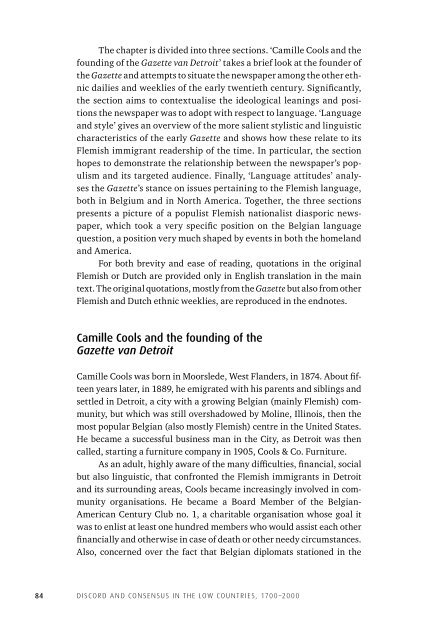Discord Consensus
7aze300jFJo
7aze300jFJo
You also want an ePaper? Increase the reach of your titles
YUMPU automatically turns print PDFs into web optimized ePapers that Google loves.
The chapter is divided into three sections. ‘Camille Cools and the<br />
founding of the Gazette van Detroit’ takes a brief look at the founder of<br />
the Gazette and attempts to situate the newspaper among the other ethnic<br />
dailies and weeklies of the early twentieth century. Significantly,<br />
the section aims to contextualise the ideological leanings and positions<br />
the newspaper was to adopt with respect to language. ‘Language<br />
and style’ gives an overview of the more salient stylistic and linguistic<br />
characteristics of the early Gazette and shows how these relate to its<br />
Flemish immigrant readership of the time. In particular, the section<br />
hopes to demonstrate the relationship between the newspaper’s populism<br />
and its targeted audience. Finally, ‘Language attitudes’ analyses<br />
the Gazette’s stance on issues pertaining to the Flemish language,<br />
both in Belgium and in North America. Together, the three sections<br />
presents a picture of a populist Flemish nationalist diasporic newspaper,<br />
which took a very specific position on the Belgian language<br />
question, a position very much shaped by events in both the homeland<br />
and America.<br />
For both brevity and ease of reading, quotations in the original<br />
Flemish or Dutch are provided only in English translation in the main<br />
text. The original quotations, mostly from the Gazette but also from other<br />
Flemish and Dutch ethnic weeklies, are reproduced in the endnotes.<br />
Camille Cools and the founding of the<br />
Gazette van Detroit<br />
Camille Cools was born in Moorslede, West Flanders, in 1874. About fifteen<br />
years later, in 1889, he emigrated with his parents and siblings and<br />
settled in Detroit, a city with a growing Belgian (mainly Flemish) community,<br />
but which was still overshadowed by Moline, Illinois, then the<br />
most popular Belgian (also mostly Flemish) centre in the United States.<br />
He became a successful business man in the City, as Detroit was then<br />
called, starting a furniture company in 1905, Cools & Co. Furniture.<br />
As an adult, highly aware of the many difficulties, financial, social<br />
but also linguistic, that confronted the Flemish immigrants in Detroit<br />
and its surrounding areas, Cools became increasingly involved in community<br />
organisations. He became a Board Member of the Belgian-<br />
American Century Club no. 1, a charitable organisation whose goal it<br />
was to enlist at least one hundred members who would assist each other<br />
financially and otherwise in case of death or other needy circumstances.<br />
Also, concerned over the fact that Belgian diplomats stationed in the<br />
84<br />
DISCORD AND CONSENSUS IN THE LOW COUNTRIES, 1700–2000


